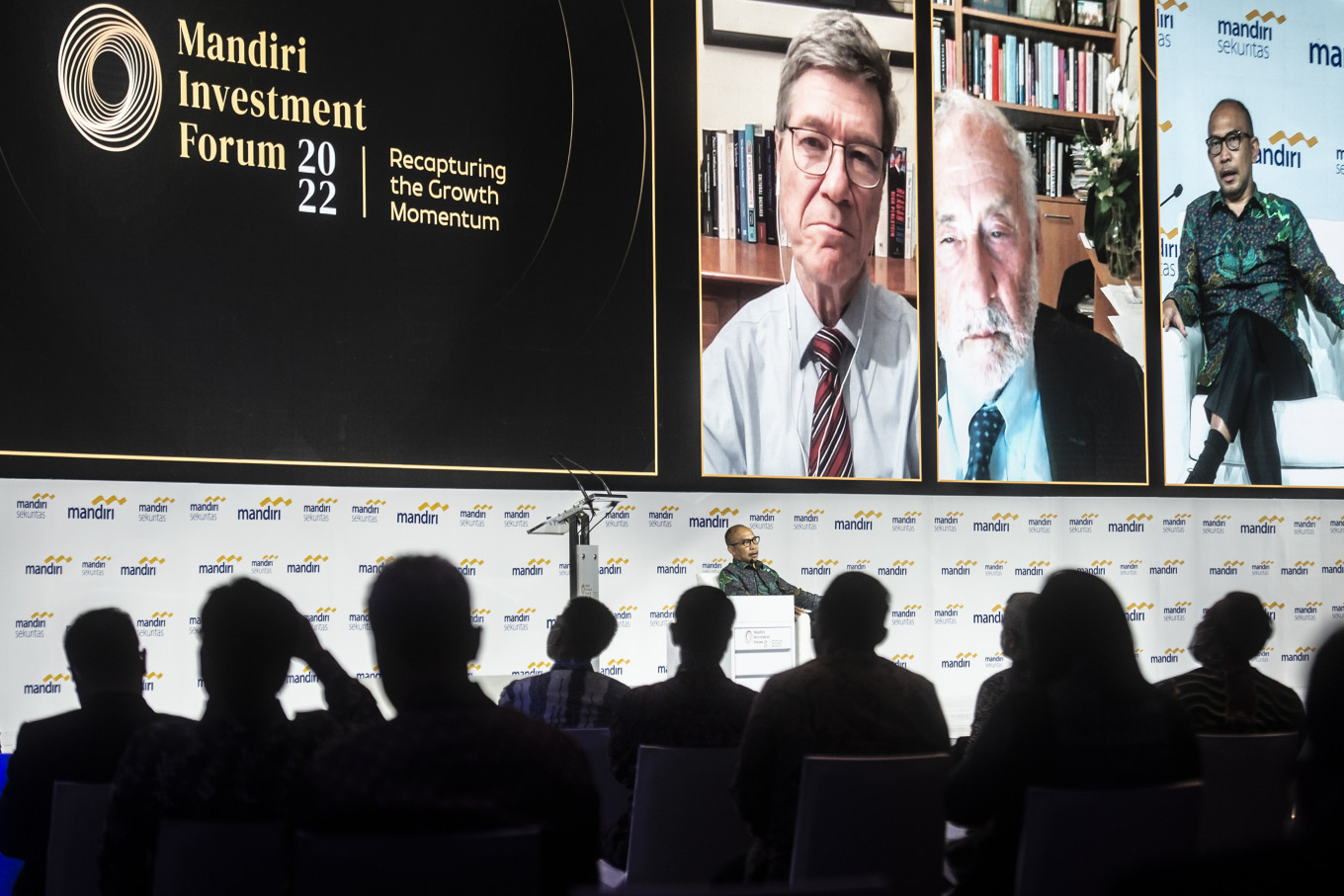Popular Reads
Top Results
Can't find what you're looking for?
View all search resultsPopular Reads
Top Results
Can't find what you're looking for?
View all search resultsG20 host RI told to end global ‘zero sum game’
Sachs, Stiglitz want Indonesia to bring China, US together.
Change text size
Gift Premium Articles
to Anyone
R
enowned economists Jeffrey Sachs and Joseph Stiglitz see Indonesia’s Group of 20 leadership as a chance for global cooperation to confront existential threats.
With the world facing a double crisis of climate change and the coronavirus pandemic, major powers must overcome their differences for the common good, the two economists have urged at an investment forum hosted by state-owned Bank Mandiri on Wednesday.
“Thank God Indonesia is hosting the G20 […] because Indonesia is friends with all sides,” said Sachs, professor and director of the Center for Sustainable Development at Columbia University.
He urged Indonesia to “please say to all parties coming to the G20, to China, to the United States, to Europe, to Russia, ‘Be nice with each other!’ You know, the rest of the world suffers if the US and China are bickering or battling with each other.”
The problems the world faced could not be solved by countries acting alone, stressed the economist.
“So, I hope that the G20 is really about cooperation. The second thing is that the G20 really needs to be about fairness in the world,” added the author of The End of Poverty, expressing his hope for Indonesia to “represent all of the developing world".
Indonesia began its year-long presidency of the G20 in December 2021. Event organizers expect some 18,000 delegates to attend more than 150 meetings in 19 cities, but the biggest event – the summit – will be held in Bali.
COVID-19 a lesson not learned
While praising vaccine development as a “major human achievement” of global scientific cooperation, Stiglitz called vaccine distribution a “disaster” with regard to the very limited supply to developing countries.
“It’s been very foolish for the advanced countries, I think, because as long as the disease festers in any part of the world, there can be mutations [that could be] more contagious, more deadly, even vaccine-resistant. The loss in GDP [gross domestic product] from this disease is in the trillions of dollars. It would cost only tens of billions of dollars to vaccinate the whole world. When I look at the cost-benefit analysis, this is an easy calculation,” said the Nobel laureate.
He added that a waiver on intellectual property could speed up vaccine output by allowing developing countries and emerging markets to produce the vaccines that are needed.
“But Germany right now is vetoing that initiative with a few other countries,” said Stiglitz, decrying a “self-destructive” policy of vaccine nationalism.
Biodiversity as a service
“Jeff and I, and many other people, have been trying to send this message: that it’s not in our interest to have this kind of nationalism. It’s in our interest, all of our interest, to have more global cooperation […] Climate change is an existential issue for the whole world,” said Stiglitz.
Both economists expressed the need for developed countries to share with developing countries the cost of reducing carbon emissions. Indonesia’s energy transformation, Sachs explained, was a task of decades.
“It’s not simple to do, but Bappenas [Indonesia’s National Development Planning Board] can do it, together with a strong financial sector and strong vision of the president,” he said, noting that there were some “very interesting possibilities” regarding blue hydrogen and the electrification of transportation, including for inter-island shipping.
“Some of that can be financed domestically through the capital markets, some of it can be financed through [budget spending]; some of it absolutely should come through […] international payments for ecosystem services because Indonesia is providing a service for the whole world in protecting the rainforest,” said Sachs.
Stiglitz described the climate as a global public good and suggested “debt-for-nature swaps” as a financing mechanism.
“Many emerging markets, like Indonesia, have been providing enormous global ecosystem services […] and this would be a way of encouraging and incentivizing them to keep those forests, maintain that biodiversity, and in return get a reduction in debt. So, there are a couple of ideas that could be put on the table of the G20.”
US ‘jealous’ of China’s progress
The two US academics used a major chunk of the hour-long session to warn against countries’ strategic competition getting in the way of global cooperation.
Stiglitz took issue with a zero-sum view of the world, where “if one country gets stronger, it means that I’m weaker. No economist thinks that way.”
Criticizing the same view, Sachs said the US was “jealous” of China’s progress. He argued that the conflict was “psychological” and there was “no deep reason” for it. Hence, he held out optimism for Indonesia to bring the sides together:
“I hope that when the Americans and Chinese come to Bali, they will be overtaken by a new spirit of cooperation. And that their friends, such as Indonesia, can say to the two of them: You know, the world is big enough for there to be two major powers without having to decide who’s bigger.”
Echoing that idea, Stiglitz noted that Indonesia was “well-positioned to try to engender the kind of global cooperation we need".
The panel discussion with the two economists at the 2022 Mandiri Investment Forum was watched live by around 23,000 participants from more than 40 countries. The session was led by Bank Mandiri president commissioner Chatib Basri, Indonesia's former finance minister










